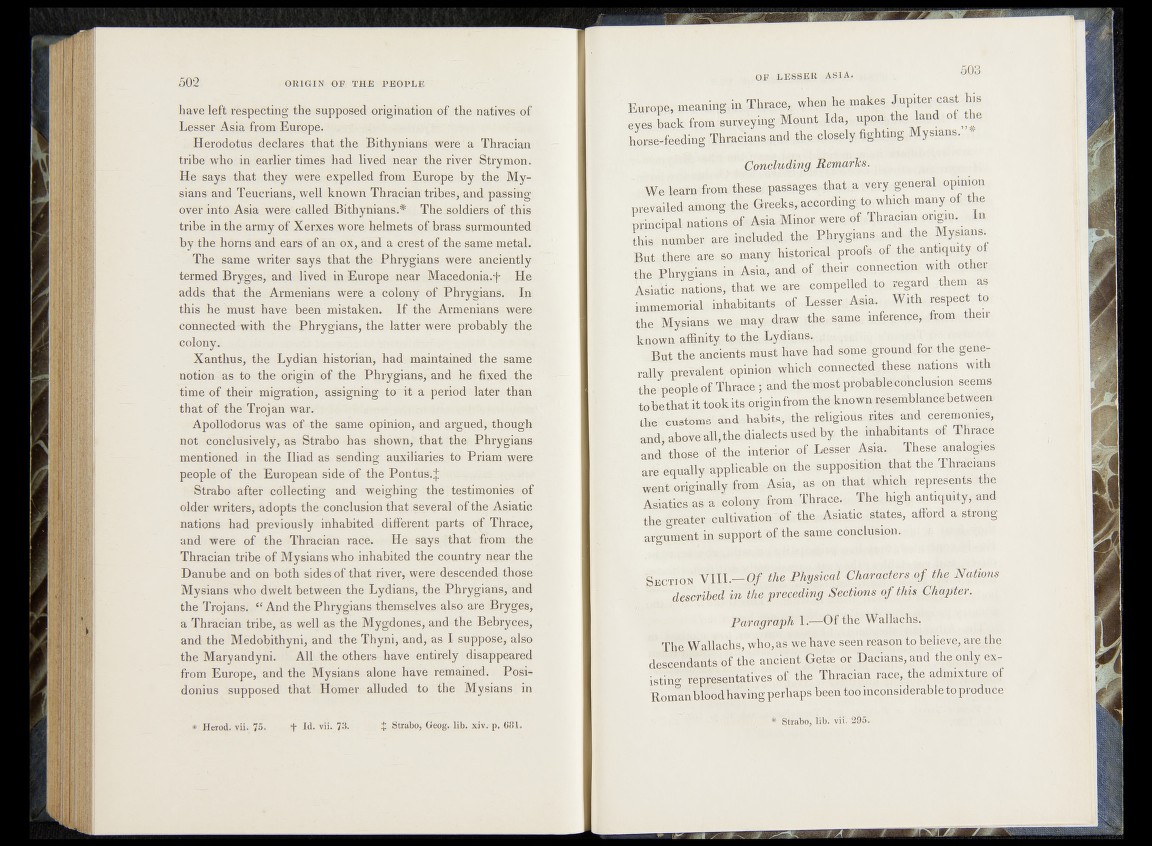
502 ORIGIN OR THE PEOPLE
have left respecting the supposed origination of; the natives of
Lesser Asia from Europe. ■
Herodotus declares that Bithynians were a Thracian
tribe! who in earlier times had lived .near the river Strymon,
He says that, they were, expelled from Europe by the My-
sians and Teucrians, well known Thracian tribes, and, passing'?,
over into Asia were called Bithyirians.# The .soldiers of this
tribe in the army of Xerxes,wore helmets of brass surmounted
by the horns and ears of an ox, and a crest of the same metal.
The same writer says that the Phrygians were anciently'?
termed Bryges, and lived; in Europe near Macedonia.^^l He
adds that the Armenians were a colony of Phrygians.' In
this he must have been mistaken. If the Armehia%ls&:were
connected with the Phrygians, the latter were j.probably Vthe
colony.t
X an thus, the Lydian historian; had maintained the same,
notion as to the origin of the Phrygians, and-bet fixed .the
time of their migration, assigning to it a period later than
that of the Trojan war.
Apollodorus was of the same opinion, and argued, though
not conclusively, as Strabo has shown, th a t the Phrygians
mentioned in the Iliad as sending auxiliaries to Priam .were
people of the European side of the Pontü&+
Strabo after collecting and weighing the testimonies* of
older writers, adopts the conclusion that several o£?the Asiatic
nations had previously inhabited different parts of Thrace;
and were of the Thracian race. He says that from the
Thracian tribe of Mysians who inhabited the country ijear the
Danube and on both sides of that river, were descended those
Mysians who dwelt between the Lydians, the Phrygians, and
the Trojans. “ And the Phrygians themselves also are Bryges>
a Thracian tribe, as well as the Mygdones, and-the Bebryces,
and the Mèdobithyni, and the Thyni, and, as I suppose^ also
the Maryandyni. ' All the others have entirely disappeared
from Europe, and the Mysians alone have remained. Posidonius
-supposed that Homer alluded to the Mysians in
*' Herod, vii. 75, f Id. vii. 7 3 . £ Strabo, Geog. lib. xivvp. 681.
. O F LESSER ASIA,
mSBMtim I m eye» back f rom ^ ^ e y ip g .A -«jni»te BI hda, muapkoens tmhe lanmd of ,thh'es
ho,fs&-*edi>lg T h ra cV sa n d the closely,fighting Mysians.
MemarVs. M
We^ learnffrom-these; pasjsjigea^hat a yfiSfegeneral opinion
prevailed among the Greeks,; a<2eqrding tpt,which many of the E B M reB ll Min« . ln
Bffi^there; are | h | historical ..$>rpofs* o£,ithe,antiquity ip f
the I 1 M M M their c o n a tio n with other MHBHBBIMmMII them a* immemorial inhabitants Wjih respect to
the M y sian ^w ^m ay draw .the §am^ i ^ n ^ f r o m their
known affinity to the L y d ia n ^ ;- ' ^ 4 ‘ 1 -r.V 1» s
But the anmeritsmust have had- some, ground,for thegene-
rallv preMent/opinion which c o n n e c t # e s e , nations with
-the people of Thrace-; and &e«most probable conclusion seeing
tobe tbat^t|took itahrigm ftam th e known resemblance between*
the customsland Mbits; the Religions. rites? and ceremonies,
and above*all;the dialects used by the inhabitants.of Thrace
and those of the interior o&JLesser Asia. These analogies
are equally ^applicable on the supposition that the Thracians-
went originally from A sia /a s.o n that which represents/the
Asiatics as a-.eolony from Thrace. T h e ^ g h antiquity, .**1
the greater aultivatioa- o£» ttie, Asiatic state®, afford a strong
Bectiqn^VIIL— Of the Physical Characters o f the Nations
described in the preceding Sections o f this Chapter.
Paragraph 1.—Of the Wallaehs.
The Wallachs^whq, a s j e Have se^nreason tojgheve, are tbç
descendante of the an c ieS ^ e tm or Dacians, and the only existing
representatives of the Thrgcian rage, the admixture of
"Roman blîod having perhaps been too inconsiderable to produce
Strabo, lib. vii. 295.